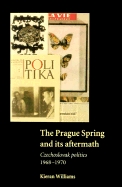Book contents
- Frontmatter
- Contents
- Preface
- List of abbreviations
- Part I Liberalization, intervention, and normalization
- Part II January 1968–December 1970
- 4 The erosion of Soviet trust
- 5 The failure of Operation Danube
- 6 Dubček's normalization
- 7 The realist ascendancy
- 8 The security police in the Dubček period
- 9 After Dubček
- Select bibliography
- Index
8 - The security police in the Dubček period
Published online by Cambridge University Press: 05 July 2011
- Frontmatter
- Contents
- Preface
- List of abbreviations
- Part I Liberalization, intervention, and normalization
- Part II January 1968–December 1970
- 4 The erosion of Soviet trust
- 5 The failure of Operation Danube
- 6 Dubček's normalization
- 7 The realist ascendancy
- 8 The security police in the Dubček period
- 9 After Dubček
- Select bibliography
- Index
Summary
One of the most sensitive areas that a liberalizing coalition has to address is the means of state surveillance. No meaningful reform of institutions can fail to deal with offices directly responsible for many of the regime's worst acts. Since liberalizers contemplate only a limited institutional modification, however, there is no desire to dismantle the machinery of coercion altogether; as Dubček acknowledged to the Soviets in May 1968, the Czechoslovak security police (StB) was ‘needed by the party as an apparatus of violence’.
Policy towards the StB exemplifies the limits of the Dubček coalition's intentions. Genuine change was desired, and many officers inside the StB shared that wish, themselves having lobbied for several years for a rethinking of the service's mission. The new freedom that liberalization was to inaugurate would be possible only if society no longer felt at risk of persecution for expressing opinions or establishing new associations in pursuit of solutions to chronic problems. With dismaying speed, however, the Dubček Presidium moved to thwart efforts to rid the country of its despised bureau of guardians.
This chapter will examine the role of the security police under Dubček by first looking at the problems of political and bureaucratic management before 1968 that convinced many officers of the need for reform; I will then analyse radical plans for the transformation of the StB in 1968 and the Dubček coalition's interventions; and I will conclude with a look at the StB in the months between the invasion and Husák's rise to power as a prelude to their revival as a force of political surveillance.
- Type
- Chapter
- Information
- The Prague Spring and its AftermathCzechoslovak Politics, 1968–1970, pp. 210 - 225Publisher: Cambridge University PressPrint publication year: 1997



